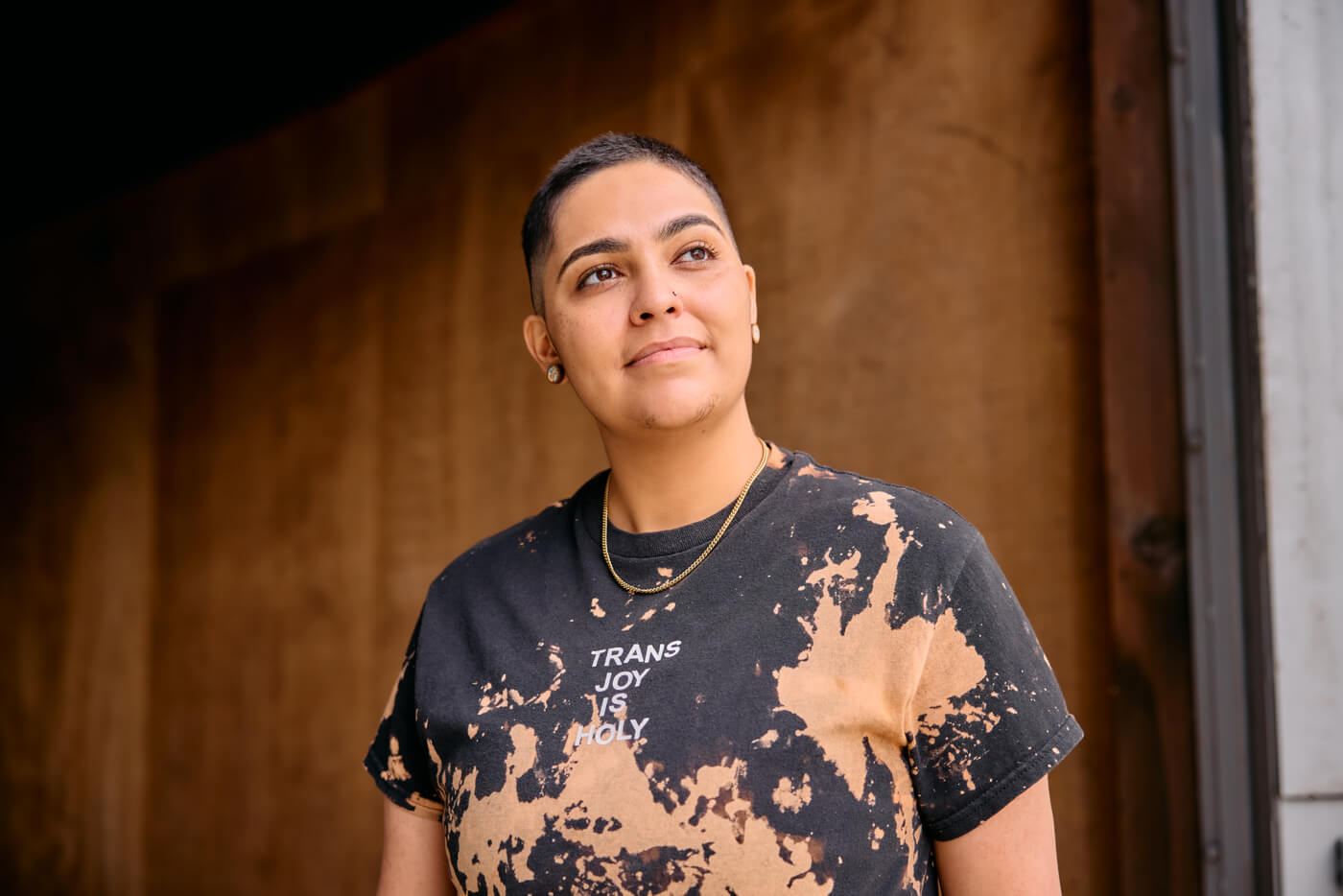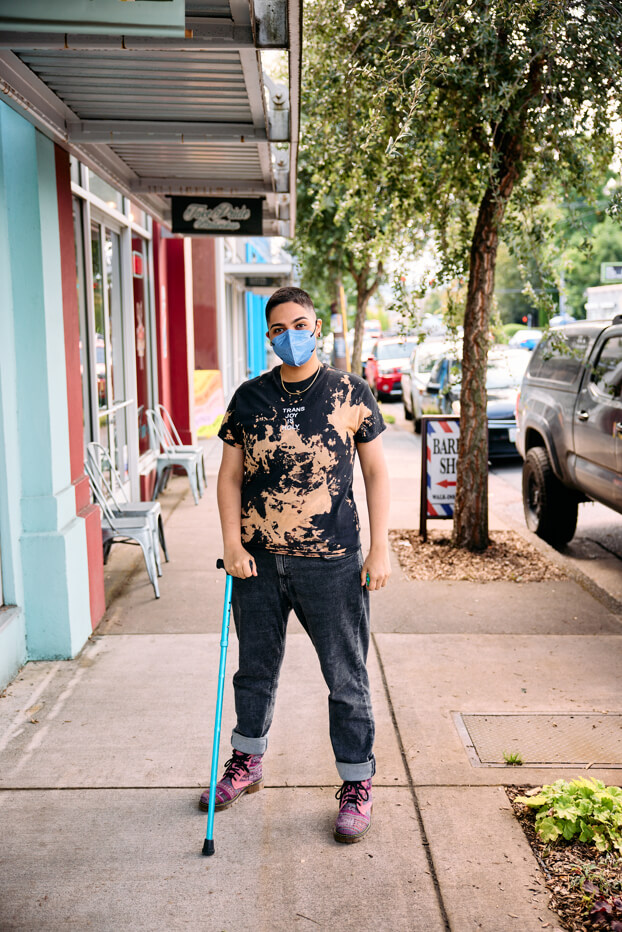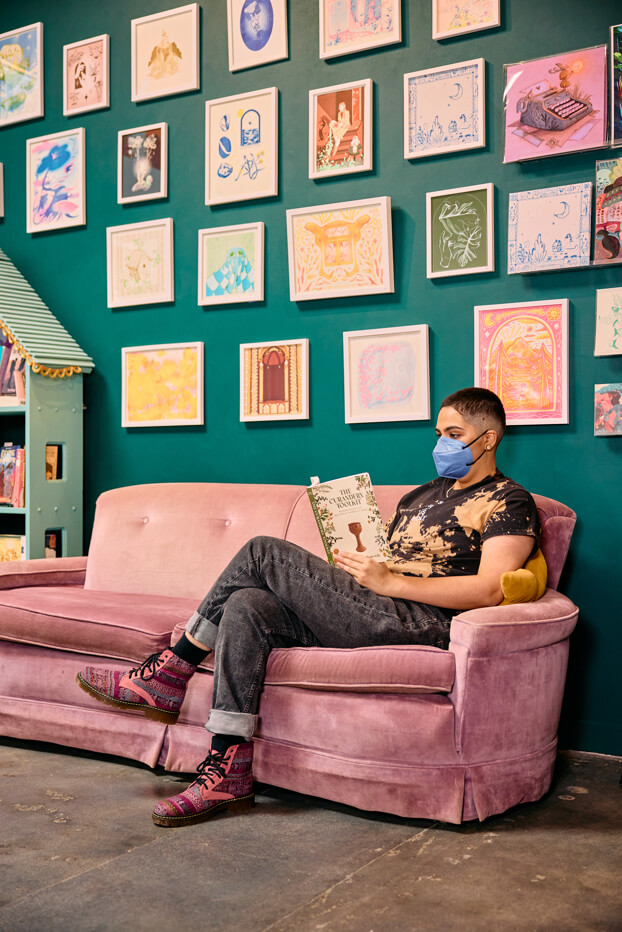October 10, 2024
Disabled And Here: Interview with Fabián
Hi! How would you like to introduce yourself? My name is Fabián, and I am a multiply-disabled Mexican & Italian-American QTPOC community organizer, care-worker, spiritualist, and artist. All of my work is grounded in a relationship-building ethic and would not be possible without the communities I have found home in. All that I do is interwoven into my vision for a better future for the communities that have nurtured me over the years.

Having moved back and forth between Seattle and Portland, what have been your experiences with its respective communities? I love Portland, but Seattle will always hold a special place in my heart. During a pivotal time in my life, while navigating college, food and housing insecurity, and the compounded challenges of racism, ableism, and transphobia as a young disabled QTPOC, I found solace in the community I built over the years in Seattle. I tapped into spaces focused on ancestral medicine and ceremony, political art, healing justice, deep QTBIPOC relationship-building, disability justice, prison abolition work, the BLM uprisings of 2013 and 2020, healing spaces for women of color, and grassroots COVID-19 safety efforts.
Disabled BIPOC community in Seattle literally saved my life and taught me the real meaning of community care and mutual aid. Disabled BIPOC community taught me that spoonie organizing isn’t just about “being inclusive,” but more about identifying needs and resources in your community and figuring out how to meet each of those needs, so that no one gets left behind or left for dead.
The disability justice community in Seattle gave me language for my lived experience of racialized-ableism. No one is coming to save us, disabled people are not surprised when state systems target us, and these realities are compounded if you are a disabled, poor, or working-class QTBIPOC. I learned about disabled genius and innovation, and that political organizing strategies, resources, and frameworks are important, but how we grow and change through being in relationships with each other is what will create something truly life-giving, and is what matters the most.

While Seattle will always hold a special place in my heart, I absolutely love living in Portland and couldn’t be happier with my decision to move back! The people I’ve met and the beautiful spaces I’ve connected with here have brought me so much joy. Life feels slower-paced here, the air is easier to breathe, and my body feels more at ease in this environment. I’ve also found people to be more open to connecting here than in Seattle, where the phenomenon of the “Seattle Freeze” was very real, even within BIPOC spaces. I vividly remember my roommates and me having conversations in our living rooms, brainstorming ways to navigate it.
That said, the overwhelming whiteness in Portland has been difficult to navigate, along with the challenges that come with being in majority-white spaces. Still, I’m incredibly grateful for the amazing people I’ve met and the communities I’ve found, including ceremony spaces where we practice curanderismo, the street medic community, and most of all Sunshine’s, a community-led tea shop that creates space for neurodivergent, Disabled, and QTBIPOC folks. Sunshine’s hosts game nights, crafting nights, and other gatherings, and it’s become a super magical third space where we’ve been able to build relationships and just enjoy time with each other!
The BIPOC and the Sick & Disabled QTBIPOC community here have carved out some incredible, life-giving spaces, though it’s taken considerable effort to find them. Our current systems are constructed to isolate sick and disabled QTBIPOC from one another, especially with the disregard for COVID precautions, as many act like we’re living in a post-pandemic world. The pandemic is still very much raging on, and masking is an act of solidarity with disabled BIPOC worldwide — a reality I wish more people, both in Portland and beyond, would acknowledge.
I am so deeply grateful for the friendships and community I’ve built here, and I continue to cherish my long distance friends, whom I consider family. I long to expand this life-saving, life-giving network. As a care worker, organizer, and artist, these connections are deeply tied to my hope of being of solidarity by growing interdependent networks of care and co-creating communities that are truly nourishing for us all.
While prepping for Disabled And Here, you mentioned that you’re also sponsored by SPM Disability Justice Fund! Can you share more about that project? I’ve been working in an administrative support capacity at Epiphanies of Equity (EOE) for 3.5 years. EOE is a Black, queer, trans, and disabled-owned consulting and research firm founded by ChrisTiana ObeySumner in 2018. We offer social equity consulting and research services for a variety of organizations, centering Disability Justice, anti-racism, and systems-level change for equity and justice. As a team of all sick and disabled QTBIPOC staff, we provide transformative, intersectional solutions for collectives, businesses, governments, and organizations aiming for innovative, sustainable, and collective success in achieving their visions.
You clearly take part in a lot of community organizing. What are some things you do to relax or recharge in between? Reading my favorite books has always meant the world to me. They’ve been like a home, a friend, and a safe place when I didn’t have any of those things — a portal to different worlds!

Going swimming outside and floating on bodies of water. Watching the sunset, laying on the earth looking up at the birds, and breathing. Walking through the park on a crisp day with my favorite turquoise cane that’s covered in stickers. Going to Kiki Balls, feeling the electric boundless queer and trans BIPOC joy there, the dance floor our altar. Smelling roses, digging my hands into the dirt while I garden, and chatting with my plants.
Making clay creations and getting lost in my paints and pastels. Doing ceremony, giving myself limpias, lighting medicine, and talking to my ancestors and creator. Listening to my favorite songs, dancing, and driving with the windows down on a warm summer night. Dancing with the people I love and sharing home cooked meals together.
Deep sharing with the people I love and having gatherings filled with Big Queer Disabled BIPOC Laughter. Cradling my goofy puppy Luce like a baby. Smelling lavender, rosemary, and lemon balm, pressing them into my skin. Looking up at the constellations on a clear night. And laying in bed, spooned out, with sunlight pouring into the room — it’s pure bliss!
Wait a second, let’s back up. Can you tell us more about your pupper? When did you get them? What kind of dog? How old is Luce? HE IS THE LIGHT OF MY LIFE! Technically Luce is not my dog, he’s my mom’s, but I am a proud tío. He is a boujie Cavalier King Charles Spaniel with a fluffy little head and he’s the sweetest pupper ever. I can’t believe it, but he’s already 2.5 years old. He is a very social butterfly who’s always very hyped whenever I come through the door, but he’ll also just fall asleep in my arms. Luce loves to eat random things and then yarf them up later. Very charming. Very weird. My favorite #1 friend.
Aww, love it. Thanks for sharing. Final question: what are the best ways to support you? If you’d like to connect with me on Instagram, especially if you are a disabled POC, my handle is @ourjoyisthespell. Feel free to send a request!
If you’d like to support my ongoing thriving and survival, please send $ to my Venmo: Fabian-Guido123.
This interview has been edited for clarity and length.